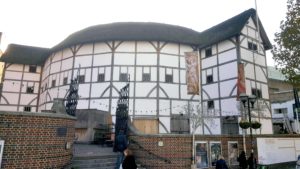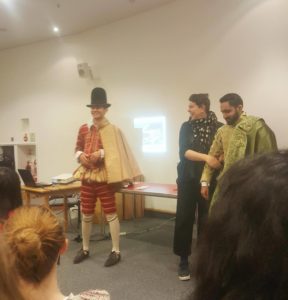Evan Meerscheidt ’19
 Shakespeare’s Globe embodies the palimpsest that is London; a space lived, acted and built on for centuries. Over 400 years ago Londoners walked across the London Bridge, the rich took boats to avoid traffic, to attend plays at the Globe. Today Londoners celebrate theatergoing, but now they take the Tube and buy their tickets online. Once in the Globe, however, with phones off and attention turned to the stage, time seems to fold in on itself, no moment is more modern than the next. In the circular Globe, experiences are infinitely duplicated; the young love of Romeo and Juliet buds and dies, only to be reborn the next day. This semester I have the pleasure to study here.
Shakespeare’s Globe embodies the palimpsest that is London; a space lived, acted and built on for centuries. Over 400 years ago Londoners walked across the London Bridge, the rich took boats to avoid traffic, to attend plays at the Globe. Today Londoners celebrate theatergoing, but now they take the Tube and buy their tickets online. Once in the Globe, however, with phones off and attention turned to the stage, time seems to fold in on itself, no moment is more modern than the next. In the circular Globe, experiences are infinitely duplicated; the young love of Romeo and Juliet buds and dies, only to be reborn the next day. This semester I have the pleasure to study here.
I am studying away at King’s College London and I wanted to choose classes that took advantage of my location in London, so I selected a class called Shakespeare’s London. The class explores London’s influence on Shakespeare and his subsequent influence on London through his writing. What makes this class truly unique is that we have had instruction at the Globe Theater six times this term.
 Since it was rebuilt in 1997, Shakespeare’s Globe has housed educational classes for all ages. In the lobby there is a typically inaccessible staircase that descends to a subterranean level of the Globe, which contains dressing rooms, storage closets and a 200-person lecture hall. On Friday mornings I have a class in this lecture hall from a member of the Globe Education Program, which is comprised of a wide array of Ph.D. lecturers. In the afternoon, we attend smaller seminars at the Globe’s secondary, solely educational facility. These ten-person discussions take place in a small, wood floored room, with mirrors on all four sides. Here we talk with actors and handle props such as Gloucester’s bloody eyeballs, used in the fall production of King Lear.
Since it was rebuilt in 1997, Shakespeare’s Globe has housed educational classes for all ages. In the lobby there is a typically inaccessible staircase that descends to a subterranean level of the Globe, which contains dressing rooms, storage closets and a 200-person lecture hall. On Friday mornings I have a class in this lecture hall from a member of the Globe Education Program, which is comprised of a wide array of Ph.D. lecturers. In the afternoon, we attend smaller seminars at the Globe’s secondary, solely educational facility. These ten-person discussions take place in a small, wood floored room, with mirrors on all four sides. Here we talk with actors and handle props such as Gloucester’s bloody eyeballs, used in the fall production of King Lear.
Last week, Dr. Hatty Barsby, who worked on costume production during the Mark Rylance era of the Globe, lectured us on the intricacies of costume and the differing schools of thought in regards to how Shakespeare’s actors should be dressed. During his time at the Globe, Rylance emphasized period dress, which Dr. Barsby suggested posed unique challenges for the costume designers who needed to recreate the popular dress of 400 years prior. Costume was essential to Shakespeare’s company the Lord Chamberlain’s Men; in fact, they spent a majority of their budget on their intricate costumes. When Rylance became artistic director of Shakespeare’s Globe modern dress was the popular way to stage Shakespeare’s plays. Rylance attempted to create an authentic atmosphere in the Globe, which had just been opened for the first time since it was closed in 1642. The time and effort that this period dress demands is astounding. Dr. Barsby shared that the Globe spent 10,000£ on one piece of cut-uncut velvet for Olivia’s dress in a production of Twelfth Night. Today, only two families in the world make cut-uncut velvet and this one piece of fabric took over a year to produce. Prior to this experience, I had never fully appreciated the intricacies and politics of dressing a Shakespearian play. I have found the classes at the Globe to complement the close readings of the plays, because they offer a theatrical perspective that appreciates certain intricacies of Shakespeare’s literature that I may have otherwise missed.

Former Globe player Dickon Tyrell mentioned that Shakespeare writes the actor’s pauses into his iambic pentameter and any missing beats are moments for pause. In fact, he asserted that breaking from Shakespeare’s meter throws off the flow of the play and makes the text almost unintelligible. In a Globe production of Julius Caesar the actor playing Mark Antony insisted on breaking what he believed was antiquated meter. The results were horrendous. Everyone else in the play adhered to the meter and received rave reviews, while the actor for Mark Antony was attacked for his muddled performance. As someone with no theatrical background, I felt that this lesson fleshed out Shakespeare’s genius in a profound way. Shakespeare’s lines do most of the work for the actor, so they do not even need to over dramatize the play, but simply read the lines Shakespeare has given them.